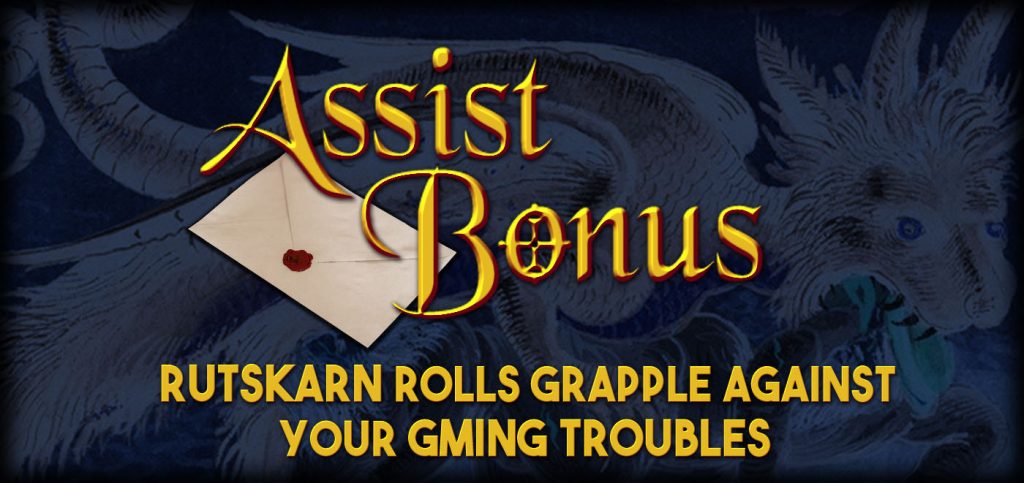Assist Bonus: How Do You Continue a Game After a TPK?

How do you continue a game after a TPK?
Triggerhappy938
If you’ve just killed your party, and that’s the “if” half this essay’s built around, you’ve only got two graceful options: start a new party or start a new campaign.
To be clear, letting the party die isn’t an invalid GM choice, but it is an extreme one. It’s affirming a commitment to an old-school theory of roleplaying: rules must instruct the narrative. As this theory would have it, a session is more “meaningful” when the rules are sincerely allowed to dictate its twists and turns: that drama, challenge, and suspense are enhanced by the threat of truly dark outcomes. If you and your players genuinely feel this way about tabletop gaming, you will do more good standing by it than flinching from it.
When you’ve killed the party, decide if the players still have unfinished business. If they were playing treasure-hunters and vagabonds taking on episodic adventures and facing down whatever dangers came up the road, let the campaign end there: the death of the heroes is a fine end to that story and excuse to start a new one. But if there’s a world unsaved, a wrong un-righted, or a beloved cause or NPC still in peril, by all means: break out new character sheets and let them make a new party to fight for it. If you’d like to have a cute subplot where these new characters recover the old party, that’ll probably go over fine. Hell, throw that subplot into a brand new campaign if you want to. Watch how tickled they are when they figure out what dungeon they’re in and whose bones they’re stepping on.
Maybe you’re thinking this won’t work for your group. You don’t feel your players will be well-served by this kind of hardnosed attitude at all. They were too invested in their characters; alternately, the story was too invested in their characters and no others can bring events to a satisfactory conclusion. In other words, your game will not be fun if your party dies for good.
To which I say: yes! You’re probably right. All that stuff I was just talking about was for a bitter, purist, dark-chocolate kind of play which isn’t just “not for everyone,” I don’t even think it’s for most groups. Which is why my advice to most GMs wouldn’t be about how they should deal with TPKs. It would be: don’t ever have them.
Wait, just “don’t have TPKs?” What about when the party’s losing a combat?
Put your thumb on the scale in one of the million ways which are available to any GM with a screen to hide behind. Take away hit points. Lower damages. Turn hits into misses. Botch as many saves as it takes.
If you’re feeling more creative, you can add all sorts of indirect “story” events which provide a graceful out to combat. A mighty new enemy arrives which threatens everyone on the battlefield, forcing both PCs and monsters into a retreat (but focusing its “successful” attacks on the monsters). A key enemy combatant stumbles onto a heretofore-unsprung dungeon trap which, as far as the party knows, had always been there. An enemy leader arrives midway through and demands the survivors be taken captive. You’re telling a story, and you’ve already decided that story is important, so tell the right story.
So wait, that means that the party can never lose a combat? Ever?
If it would kill them all? Yes, that’s absolutely correct. So?
Won’t that cheapen the game?
It’s a trade-off, to be sure, but if you’re not willing to let your party die for real it’s one you already decided to make. If they’re the protagonists, and their failure is not a valid ending to the story, haven’t you already accepted that you won’t kill them all off?
Sure, but…maybe they could be resurrected by an NPC? Like, “you wake up in a strange place, and hear a voice say…”
Okay, I’ve been here before. I think everyone will end up in that mysterious dungeon or sinister lab or stranger’s manor sooner or later, especially if they play with new GMs. Many times I’ve listened dutifully as the not-totally-on-my-side NPC outlined whatever price or consequence or humiliation my resurrection bears with it. I don’t know why every GM has this same idea, or why we all think it’s a good one, but with the benefit of experience and hindsight I offer the following question:
Why bother?
When you resurrect a TPK’d party, even by exacting a “fair” price, you send exactly the same message as when you spare them through your narration: you guys can’t actually die until you’ve finished the story. The only difference is that you do it in a clunkier, far more humiliating way. You risk identifying yourself with the NPC who saved them: a condescending patron who expects gratitude for saving a doomed, incompetent party. Isn’t it much better to just stack the damn combat a little and let the players move on?
But there needs to be consequences for failure. Otherwise, the story won’t be dramatic.
First off, let’s say your (for the sake of argument) Dungeons and Dragons campaign was a fantasy novel. If you were reading a random fight scene in the middle of the book, would you be seriously concerned that all of the heroes were about to die? Or would you figure that, you know, maybe it won’t go all their way—maybe party members will get hurt or even killed—but as a group, they’ll probably survive and keep adventuring? Yet you wouldn’t argue that the novel couldn’t be suspenseful and engaging, would you?
So how does it lose those qualities when you take it to the tabletop, remove all certainties besides “the heroes probably won’t ever lose,” and give each player a personal stake in its main characters?
So why even have combat rules if the heroes always win?
Again, if you insist on genuinely decisive and lethal combats, the question is not “should you save the protagonists from a TPK.” The question is, “should you have ever framed the party as protagonists to start with.” If combats cannot actually dictate the narrative, they were already defanged and the rest is semantics.
Anyway, the obvious answer to this question is that combats are fun. Players like engaging with mechanics and trying to avoid danger. Even if you came out and told them “I won’t ever let a combat end with every player dying,” they’d probably still have a good time, just like I have a good time trading blows in Skyrim even though I can quickload whenever I don’t like how a battle’s going. But obviously, you won’t be that explicit with it. You’ll modify dice here and there, nudge numbers around, and leave all the nitty-gritty details ambiguous. Most players like rolling dice, figuring out how to confront obstacles, and imagining cool combats more than they like overthinking things. Most players won’t be able to tell the difference between surviving every combat because you’re good at encounter design or surviving every combat because you modified the encounters based on how well they were going.
If your players are the exception, sure, take the kid gloves all the way off: they can probably handle (and even appreciate!) a TPK that sticks. But otherwise, I say leave them be. If you’re going to play it hard, play it hard; if you’re going to cheat, cheat in the way that slows things down the least.






On the subject of the resurrection by a stranger, just go full out and have the BBEG be the one to put the party under a geas while resurrecting them. That way the party must can try and work to find a loophole in the instructions and be in a perfect position to stab the BBEG in the back. Though with all things it must depend on the group to accept that sort of outcome.
Yes, that definitely could be fun for the right group or scenario!